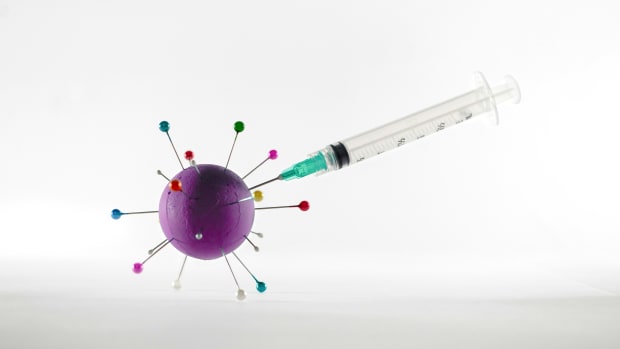
Is the Netherlands five years on ready for the next pandemic?
The question is not whether there will be another pandemic, but when. The Dutch Safety Board concluded that the Netherlands was insufficiently prepared for Covid-19. That has now changed, say UvA immune response specialists Marieke van Ham and Anja ten Brinke.
You would almost have forgotten again: five years ago, the Netherlands entered its first lockdown. In the aftermath of Covid-19, the Dutch Safety Board concluded that the Netherlands was insufficiently prepared for a long-term health crisis of this magnitude.
In addition, last year the cabinet announced three hundred million euros in cuts to the policy program to be better prepared for the next pandemic. Public health organisation GGD GHOR Nederland is calling for these cuts to be reversed, saying the cabinet seems “unwilling to implement the lessons of the corona crisis.”
UvA professor of immunology Marieke van Ham and infectious diseases researcher Anja ten Brinke are part of the group of researchers in the Netherlands at the Swammerdam Institute for Life Sciences (SILS) and the nonprofit organization Sanquin blood supply preparing for the next pandemic. Are scientists now - five years since the first measures - well prepared for a pandemic?
Prepared for the next one
“There will definitely be another pandemic,” says Van Ham. “There are so many people on the planet and we travel all over the world. We also live in close proximity to wild and non-wild animals, which increases the chance of transmission of new viruses and bacteria. Once a new virus or bacteria pops up, it is difficult to prevent a pandemic.” This realization makes it even more urgent to be systematically prepared for a future pandemic, Van Ham and Ten Brinke believe.
The announced budget cuts undermine the Netherlands’ preparedness for the next pandemic, according to Van Ham and Ten Brinke. “We are concerned that accumulated knowledge will be lost and the researchers who now have the right knowledge will partly disappear if resources are not made available to continue pandemic preparedness research. Budget cuts pose a great risk that further research to best prepare for a new pandemic with an unknown pathogen will not happen.”
Although budget cuts raise concerns for the future, Van Ham and Ten Brinke are positive about how well prepared the Netherlands is now for a pandemic. When asked if we are now well prepared for a pandemic, they resolutely answer yes. “No one needs to doubt that,” Van Ham emphasizes.
The large-scale and detailed knowledge of defenses against new diseases that we have gained” is the most important thing contributing to our better preparedness for a pandemic, according to Van Ham. “A list of 50 pathogens that could potentially cause a pandemic has been identified. Scientists are already developing vaccines against these viruses.”

Looking back
How prepared was the Netherlands for the previous pandemic? Van Ham says that in the first phase of the Covid-19 pandemic in the Netherlands we did not have all the technology ready: “Sometimes we were missing important devices, for example the device with which you can quickly and easily study many immune cells.” Like many other countries, the Netherlands had to quickly scale up research on the virus and effects on the immune system.
“But,” Van Ham continues, “the Netherlands was well prepared in the sense that we had enough experts in-house and we knew what was important to study, such as which groups of people were at extra risk of reduced immunity when infected or despite vaccination.” There were immune and disease research groups scattered throughout the Netherlands that came together as a consortium in the first weeks of the pandemic and, supported by the RIVM and the Ministry of Health (VWS), were able to work together quickly and purposefully. “In our case, that was the consortium called “Target to B” that investigated how people with autoimmune diseases who receive medications that suppress the immune system would respond to the coronavirus. After only one week since the first lockdown was announced, our researchers were already back in the lab,” Van Ham says.
Collaboration between immune system specialists
“Each research group in the Netherlands has its own specialty and we combined them,” says Van Ham. Initially, the research groups worked on other diseases, such as cancer or rheumatism. During the pandemic, that knowledge about the immune system came in handy and they formed one large research consortium to study the SARS-CoV-2 virus (the causative agent of Covid-19).

The national alliance of defense specialists - created in the frenzy of the corona pandemic - still exists and now forms the “research pandemic preparedness” group. Van Ham: “Without knowing it five years ago, we are now part of the research pandemic preparedness group. We all know each other and know exactly who has what expertise.”
And because this Dutch partnership is actively maintained, we would now be better prepared for a future pandemic. “There is a lot of turnover of people in the research world. Through this project we keep existing and new people up to date in terms of knowledge and we keep the technology up to date with the best equipment,” Ten Brinke explains. “And in the next pandemic, we know who is the expert to study which part and how much manpower to put on which studies,” Van Ham says.
Smart testing, faster action
In addition, researchers are now better prepared to more quickly and specifically test who is at greater risk of becoming ill from a virus or bacteria. “We can now set up tests faster to measure how someone reacts to a new infection,” says Van Ham. “This will allow us to advise at the early stages of the spread of the virus which high-risk group needs, for example, three vaccines instead of two, as was advised for people with autoimmune disease during Covid-19.
An important breakthrough during the corona pandemic was the large-scale development of mRNA vaccines, which also better prepare us for the next pandemic, Van Ham explains. “The big advantage of mRNA is speed: an mRNA vaccine can be developed in just a few months, whereas traditional vaccines can take at least two years. That time saved makes all the difference in fighting a new virus.”
“What is also not an unimportant part of good pandemic preparedness is logistics,” Van Ham says. “During Covid-19 we had to negotiate all the way in China to get enough plastic tubes for research,” Van Ham says. It showed how vulnerable the logistics chain was - and how important it is to be able to scale up early. “We now know what stuff, like these tubes, we need to scale up early during a pandemic.”
Still, Ten Brinke stresses, you can’t expect to have everything under control immediately during the next pandemic: “At the same time, we can’t be prepared for everything - you can’t have factories with face masks on standby or ICU beds on hold indefinitely. That asks too much of a society.”

